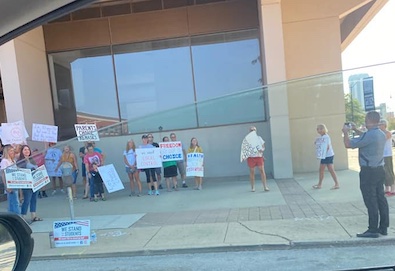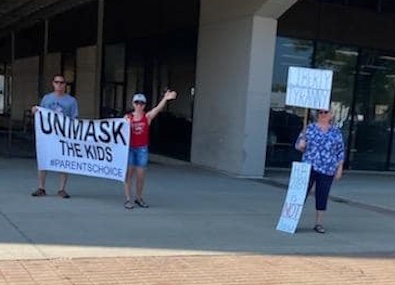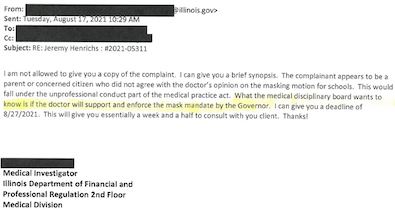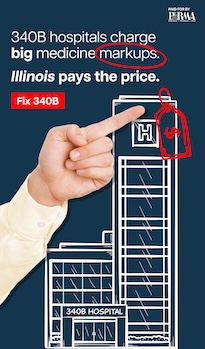A quick Illinois Republican Day roundup
Thursday, Aug 19, 2021 - Posted by Rich Miller
* Some may have been uncomfortable, but nobody said anything to disavow this guy’s “jokes.” State party chair Don Tracy told reporters afterward that he doesn’t like fat jokes and he doesn’t like face jokes, but wouldn’t go any further than that…
In general, it’s a good idea to leave the jokes to comedians. Also, maybe vet the speeches beforehand? Sheesh.
Along those lines, US Rep. Mary Miller avoided saying anything goofy today, so that’s a plus. She spent most of her time talking about a school board race in Tennessee, however. Miller (no relation) rarely ever talks about her own district.
* More from the show…
43 Comments  
|
An Illinois State fair programming note
Thursday, Aug 19, 2021 - Posted by Rich Miller
* I’m heading to Republican Day at the Illinois State Fair. Please be nice to each other in comments and I’ll post again later this afternoon.
Comments Off  
|
Trailer, trade-in taxes will soon be reduced
Thursday, Aug 19, 2021 - Posted by Rich Miller
* The Center Square…
Consumers in Illinois looking to trade in vehicles will continue to be double taxed for a few more months, but come Jan. 1, the $10,000 tax cap on such transactions will be removed with a law recently enacted by the governor.
Also starting next year, drivers wanting to get tags for their small trailers in Illinois will be paying less, but not as low as they paid in 2019.
As part of the governor’s multi-year $45 billion infrastructure plan enacted in the summer of 2019 that doubled the gas tax and pegged annual increase to inflation also increased a variety of other fees. One measure increased the tax for some classes of trailers from $18 to $118.
Lawmakers recognized it was an error. This past spring they passed a measure in Senate Bill 54 to drop the fee from $118 to $36. Without any fanfare, the governor signed the bill earlier this month.
ABATE of Illinois’ Josh Witkowski said it’s a win for motorcyclists and other drivers.
“Not only the trailer that you would tow a motorcycle on, but this affected the itty bitty little 300-pound trailers that you tow behind a motorcycle as well,” Witkowski told WMAY. “It was something that a lot of my off-road riders and motorcycle riders were both yelling about and a lot of people were angry all over the state.”
9 Comments  
|
COVID-19 roundup: School mask mandates edition
Thursday, Aug 19, 2021 - Posted by Rich Miller
* WIFR TV ran a completely one-sided story that offered no context or quotes from local hospital officials or references to the CDC…
Twenty-nine schools across the state are on probation for not complying with Governor J.B. Pritzker’s mask mandate and one of them is right here in Winnebago County.
Durand school district has decided to go against the mask mandate and risk losing several key resources like funding and the opportunity to participate in IHSA sports. It also means graduating seniors won’t receive a credible diploma.
“We’re just exploring all our avenues here,” said Kurt Alberstett, Durand schools superintendent.
Alberstett says the district is standing firm with it’s decision to leave masking up to the parents even though the Illinois State Board of Education has placed the school on probation. […]
“Being that my kids are athletes, I don’t think that that’s fair for the kids,” said Christiana Ekberg. “I also don’t think that it’s fair that they have to wear a mask while playing sports either because it’s very difficult when you are running up and down a basketball court trying to keep a mask on your face. They start off as the mask on, and then it goes under their nose, and then it becomes chin guards and we see that all too often happening.”
Reporters need to get the heck off Facebook. Social media is not reality. Provide some newsy balance to the online insanity, for crying out loud. Also, the sports parents made the biggest stink last year, and they appear to be doing it this year as well.
* Also, too, the number is up to 32…
ISBE has placed a total of 32 school districts on probation so far, but some schools have already taken steps to reverse their mask policy course in order to be taken off the state’s probation list.
* Tribune…
Kyle Thompson, regional superintendent of the Charleston-based Regional Office of Education #11, which covers several counties including Clark, Edgar and Shelby, said in a Wednesday email that he is seeing “districts all over the map — followed, haven’t followed, probation, not yet on probation.”
“I know a handful received emails (from ISBE) requesting a response within 24 hours, while others have yet to receive that email,” Thompson said. “To be honest, I am not sure how ISBE is tracking it so fast.”
That isn’t much of a mystery. Outraged parents are undoubtedly notifying the state board, because some are also notifying people like me. Plus, I assume the ISBE is monitoring local news coverage.
* There was a little school mask protest at ISBE yesterday…


* Other news…
* Chicago Teachers Union has yet to reach agreement with CPS as start of school looms; district says CTU ‘is rejecting science for their own gain’
* Parents Are Losing Their Minds Over Masks in Schools
* University Of Illinois President On Why Students Must Be Vaccinated To Attend Fall Semester
* Soaring COVID-19 numbers, low vaccination rates leave Menard County officials ‘frustrated’
* Why A Hard-Sell Pitch For COVID Vaccines Won’t Work In This Rural Illinois Town
* Republican lawmakers challenge ISBE’s enforcement of school mask mandate
24 Comments  
|
* The state finally has the money to up its investments in anti-violence initiatives, but it will take a while to get new programs off the ground because both Gov. Bruce Rauner and Mayor Rahm Emanuel eviscerated the programs. Here’s an existing program which shows real promise…
Last year, Taylor was shot by rival gang members while he was walking to the store. His first thought was revenge. But anti-violence workers from the Youth Peace Center in Roseland and the gun violence nonprofit Chicago CRED heard about the shooting and were worried about retaliation.
They got Taylor’s number from a CRED participant who knew Taylor from the neighborhood. They called him and helped talk him out of going back at the group who shot him.
This time the people telling him to put the gun down were actually offering an alternative. The CRED program offers life coaching, job training, a salary and online classes to get a high school diploma.
On Thursday, Taylor, now 28, will be one of 46 men and women from the CRED program to celebrate earning their high school degree. These are people fighting to get out of a life of gun violence. People who, like Taylor, have already started down a new path, and who are hopeful their high school diplomas will be as big a turning point in their lives as when they joined a gang or first carried a gun.
Richard Blackmon, a Chicago CRED life coach, pointed to data showing the vast majority of prison inmates do not have a high school degree as evidence of what a difference the diploma can make.
Go read the whole thing.
5 Comments  
|
Metro East hospitals bracing for “fourth wave”
Thursday, Aug 19, 2021 - Posted by Rich Miller
* Belleville News-Democrat…
Mike McManus, president and CEO of Memorial Hospital, projects the worst is still to come from the COVID-19 pandemic.
During St. Clair County’s weekly COVID-19 briefing Wednesday, McManus said his medical group has seen coronavirus hospitalizations jump from the mid-20s last week to the low-40s this week, with 91% of those individuals unvaccinated. And that number, he projected, will continue rising until at least the second week of September.
“We could reach or exceed the highest we’ve ever been in by the second week of September,” he said. “And the St. Louis Pandemic Task Force says these projections out there, they show the week after Labor Day, the curve is going up pretty high. And, again, 91% of those likely will be unvaccinated.”
He also noted the trickle down from significant portions of the population remaining unvaccinated, while calling the present situation the “fourth wave” of COVID.
“The more unvaccinated we have — at least from my perspective — the more hospitals will be overwhelmed; the more schools in my opinion will likely be shut down because there’s going to be an outbreak somewhere because under 12 you don’t get vaccinated; travel I think will be impacted. Not to mention creating an environment for new variants among unvaccinated,” he said. […]
“The last five weeks, we’ve seen a trending up and we’re seeing younger patients of all ages trending up,” he said. “The one bright spot I can say in this right now, is the 75+ age group is flat or declining over those last five weeks. Every other age group is going up. That’s because that 75+ group is largely vaccinated. So that’s good.”
McManus also noted the disproportionate amount of Black patients they’ve seen compared to the white population. He said the shift is a sharp change from what McManus called “the previous three waves.”
The Biden administration, the Pritzker administration and local public health departments need to up their games now. All of the polling shows that Black people are no longer overtly resistant to getting the shots, unlike hardcore white Republicans. That means something else is going on.
7 Comments  
|
Republican Day preview
Thursday, Aug 19, 2021 - Posted by Rich Miller
* Nobody seems to know what US Rep. Mary Miller might say today during her speech at the Illinois State Fair’s Republican Day festivities…
* Rodney Davis will also be on the dais, but Adam Kinzinger is not on the official speaking list…
“One thing I think the Democrats in Springfield and throughout Illinois understand about me: I’m not afraid to fight.” [Rep. Rodney Davis said]
“I fought Republicans and Democrats in one of the most competitive districts, not just in the state, (but) in the nation for the last 10 years,” he continued. “And remember, Democrats drew this district to elect a Democrat in 2011, and we’ve beaten them every time. So they know I’m okay and ready for a fight. We’ll assess what fight I’m going to be in once that map comes out.”
Beyond Davis, Rep. Adam Kinzinger, R-Channahon, may also have reason to worry. Even if the prominent critic of former President Donald Trump survives a GOP primary, his home might be drawn into a district based in the growing Chicago suburbs and exurbs, which have a more Democratic tilt.
* US Rep. LaHood and Senate Republican Leader Dan McConchie will also be speaking today…
“There is a lot of opportunity for us going into the 2022 cycle to win back seats, both in Illinois and across the country,” U.S. Rep. Darin LaHood, R-Peoria, told The State Journal-Register. […]
McConchie, one of the scheduled speakers at the invitation-only noon rally on the Director’s Lawn, said Republicans have always stood for freedom, “responsibility of the individual” and “limited government to maximize freedom for people.”
He said he will repeat that message at Thursday’s rally.
“When we are our strongest is when we come around those areas of principle that frankly I believe the vast majority of Americans still believe and embrace,” McConchie said.
* From this morning’s state central committee meeting…
* The gubernatorial candidates aren’t scheduled to speak at the fairgrounds, but a statewide Republican candidate was ridiculed by reporters several years ago for saying something similar to this during the fair…
* Related…
* Gary Rabine hopes to defeat ‘dictator’ Gov. JB Pritzker
* The GOP is losing the argument on coronavirus mandates
18 Comments  
|
|
Comments Off  
|
* You’d think they’d have better things to do. Here’s Mark Maxwell…
State investigators who grant and revoke medical licenses have opened an investigation into a sports doctor at Carle Hospital because of his personal stance opposing a mask mandate in schools, according to emails he says he received from the Illinois Department of Financial and Professional Regulation (IDFPR).
Dr. Jeremy Henrichs, a team physician for the University of Illinois’ Athletic Department, is also an elected member of the Mahomet-Seymour school board. Despite his opposition to mandatory mask rules in classrooms, the school district will still enforce the Governor’s new statewide school mask mandate and require all students to wear masks in class, according to documents posted on its website.
IDFPR regulates medical professionals, architects, cosmetologists, and a number of other industries in which workers are required to obtain a license to practice in Illinois. The Pritzker administration said the investigation was merely a matter of “due diligence” after someone filed a complaint, and offered assurances that the outcome of the investigation would not lead to the doctor losing his license.
“The Pritzker administration has not and will not seek disciplinary action against the professional licenses of individuals who disagree with the mask mandate,” Governor Pritzker’s spokeswoman Jordan Abudayyeh said. […]
While Pritzker’s office said state investigators at IDFPR are required to open investigations whenever they receive a complaint about a medical professional, they did not explain why those investigations might also seek to gather information about a doctor’s personal views for their votes as public officials.
* Check out this ridiculous demand and subsequent explanation from a state medical investigator…


Like it says in the story, the Mahomet-Seymour school board didn’t even vote to follow the mask mandate. The district is doing the responsible thing and accepting the governor’s mandate.
The Pritzker administration has been pretty good so far at avoiding creating any martyrs. Until now, that is. Whoever is responsible for this, including anyone who signed off on that ridiculous demand, needs to be disciplined to the fullest extent possible.
Dr. Henrichs is owed an official apology.
*** UPDATE 1 *** Sen. Chapin Rose has filed a formal complaint with Illinois’ Executive Inspector General. Click here. Among other things, he alleges possible violations of two criminal statutes…
Threatening Public Officials. 720 ILCS 5/12-9: “(a) A person commits threatening a public official or human service provider when: (1) that person knowingly delivers or conveys, directly or indirectly, to a public official or human service provider by any means a communication: … (ii) containing a threat that would place the public official or human service provider or a member of his or her immediate family in reasonable apprehension that damage will occur to property in the custody, care, or control of the public official or his or her immediate family; ….”
Intimidation. 720 ILCS 5/12-6): (a) A person commits intimidation when, with intent to cause another to perform or to omit the performance of any act, he or she communicates to another, directly or indirectly by any means, a threat to perform without lawful authority any of the following acts … (6) [t]ake action as a public official against anyone or anything, or withhold official action, or cause such action or withholding … .”
*** UPDATE 2 *** Text from Sen. Rose…
Fact: in the only vote that was taken on the matter (which was prior to the gov’s edict), Dr Henrichs actually voted to exceed the then current CDC guidelines (which did not require masking, only “recommended”) by requiring masks when community spread was required. Indeed, under the guidelines that Dr. Henrichs actually voted for, Mahomet schools would be masked today anyway. There has been no vote to date on the governor’s mandate- and according to the supt., there will not be, because their board attorney advised them they don’t have the authority to supersede the governor. It is important that people not label Dr. Henrichs as “anti-mask.” That simply isn’t true based on the only vote that exists on the record. But yet, he is still being persecuted by the Pritzker Administration anyway. This is simple: the Governor needs to back off, apologize, make sure that this is not happening to anyone else, and let everyone move on. He has had 6 days now to do that and he hasn’t. At what point do you conclude that in the absence of action to stop this, it is actually willing consent? Silent complicity speaks volumes.
34 Comments  
|
* Background is here if you need it. Press release…
The following was released by SEIU Healthcare Illinois President Greg Kelley on the Mandatory Vaccination of Healthcare Workers:
As a union of healthcare workers dedicated to public health and well-being, we are committed to vaccination as a crucial step towards safeguarding the health of care recipients, care givers and entire communities.
A collaborative approach between the union and employers is crucial at a time when new variants are threatening to prolong the ongoing crisis.
As healthcare employers increasingly turn to mandatory vaccinations in their efforts to stop the spread of COVID-19, it is evident that a comprehensive and collaborative approach is needed to effectively protect workers, patients and entire communities. It is crucial that workers and frontline employers work together to not only significantly increase vaccination rates, but to do so in a way that respects the needs of frontline caregivers and gives them a voice in the process.
Employers have a role to play in fostering this collaborative approach by showing their willingness to partner with the union to provide workers with the resources that enable these frontline caregivers to be vaccinated without negative economic or other impacts. This partnership includes educating and engaging healthcare workers to increase vaccination rates and bargaining over sick days and paid time off so that employees will not be facing mandatory vaccinations without sufficient paid time off should they suffer any hardship. Additionally, employers need to listen and proactively respond to and act upon worker concerns.
We support mandated vaccinations for healthcare workers in conjunction with a comprehensive education program as a means to better protect workers and care recipients by moving facilities and communities towards the necessary herd immunity required to stop the spread of COVID-19 and by protecting vulnerable populations from the ravages of the virus. At the same time, we strongly urge healthcare employers to partner with the union and listen and respond to worker voices and worker needs in the implementation of vaccination mandates.
18 Comments  
|
Open thread
Thursday, Aug 19, 2021 - Posted by Rich Miller
* A sign over the entrance to an Illinois State Fair dairy barn…

Anything on your mind?
20 Comments  
|
|
 Support CapitolFax.com
Support CapitolFax.com
Visit our advertisers...
  ...............
...............
 ...............
...............
 ...............
...............
 ...............
...............


|
   
|
Hosted by MCS |
SUBSCRIBE to Capitol Fax |
Advertise Here |
Mobile Version |
Contact Rich Miller
|



















